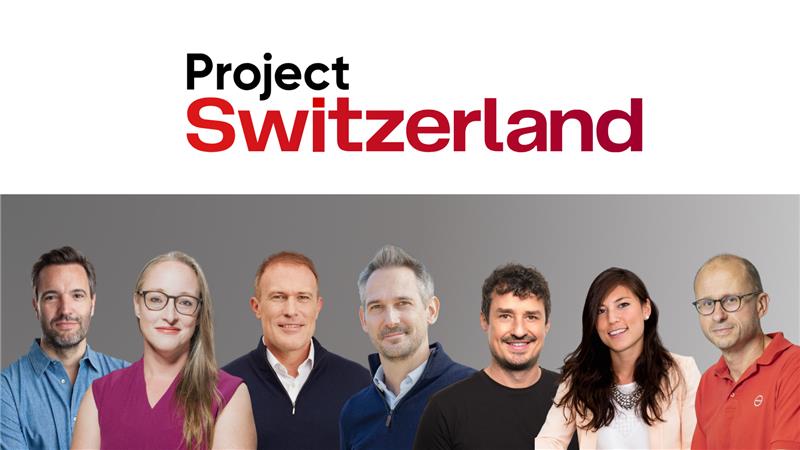/
Millions for Research but no Money for Growth: Swiss Startups are Looking Abroad for Investors
Original Article by Malin Hunziker. Translated and reproduced with consent from NZZ

ETH Zurich and other universities generate many young startups. But when these companies aim to scale, they often run into a shortage of venture capital – and begin looking for funding in China, the U.S., or Saudi Arabia.
There are researchers for whom being scientifically successful and developing their ideas in the lab is not enough.They also want to bring those ideas to market and turn a discovery into a product, an idea into a business.
One such researcher is Deana Mohr. In 2012, while she was a doctoral student at the University of Zurich, working on a method to cultivate human muscle tissue. Her doctoral thesis provided the final data sets needed for clinical trial approval. She saw tremendous potential in the method and went all in.

“I could have chosen the safer path and gone into the pharmaceutical industry,” she says. Mohr decided otherwise. She transitioned from researcher to entrepreneur. What followed was a long road for a startup that began with great promise but is now at an impasse.
Mohr now employs 21 staff members. She needs funding for further growth, to expand her lab and office space. Her next financing round aims to raise 20 million. But she can’t find it, at least not in Switzerland.
Although the biotech sector, to which Mohr’s company belongs, is known for being capital-intensive, many Swiss startups face the same challenge. Once they reach a certain size, they can’t progress further in Switzerland. Within the startup scene, people say that innovations can’t be commercialized here, that you have to scale abroad. In plain terms: Switzerland has the ideas. They become big and profitable elsewhere.
Things go well at first
Bright engineers and programmers at research institutions and universities like ETH and EPFL are working on new technologies; they have the equipment, initial capital, and meet like-minded people. For Mohr, too, everything went well at first.
Her initial target for the new method is to treat women suffering from incontinence. The plan is to inject the cultivated muscle precursor cells, suspended in a solution, into the bladder sphincter muscle of the affected women to strengthen it. Mohr’s team at the University of Zurich received approval from Swissmedic in 2015 to test this therapy on nine women. The Wyss Research Center of the University of Zurich and ETH provided infrastructural support, and in 2016, the team secured six and a half million francs from the European research program Horizon.
Mohr founded the startup Muvon Therapeutics with three others and began building her team. The company grew.
“At first, you get a lot of support in Switzerland,” says Mohr. But eventually, you can’t move forward. One challenge is the small domestic market-startups aiming for a certain size inevitably have to orient themselves internationally. For that, they need the right business model. Often, though, they also run up against a lack of venture capital
Such venture capital is why VC firms invest in a range of startups, hoping that a few will succeed-maybe even to the point of becoming a ‘unicorn,’ a billion-dollar business.
The business model of venture capital firms works by spreading risk. They look for young companies with potential and invest millions-even at the risk of losing it. But they also hope for returns many times the size of their initial investment. In their portfolio, the few successful startups compensate for the losses of the many that fail.
Searching for money in Saudi Arabia and China
In recent decades, venture capital has evolved in Switzerland. There is plenty of seed funding available for startups, so the good ideas coming out of ETH and EPFL research centers do get turned into business models.
However, when young companies want to grow and seek investments of 10 million or more, the money in Switzerland is often lacking. The market is fragmented. There are many smaller venture capital firms that make single-digit million investments. Data from the Swiss Venture Capital Report show that last year, the number of growth-stage financing rounds for young companies declined more steeply than average.
As a result, startups in the growth phase (also known as scale-ups) frequently turn to foreign investors. That’s also true for Mohr’s company. She’s now looking for investors in the USA, Saudi Arabia, and China.
According to a European Investment Bank study from 2024, 82 percent of scaleups in Europe are primarily financed by a foreign investor. In San Francisco, that figure is 14 percent.

Entrepreneur Jeannette Zu Fürstenberg heads European operations for the international venture capital firm General Catalyst. Through it, she initiated a Europe-wide effort to invest in artificial intelligence, which was unveiled at the AI summit in Paris in February. Zu Fürstenberg writes in response to an inquiry that it is not a new development for foreign investors to invest in European startups.
We should see it as a wake-up call:
“Non-European investors recognize Europe’s potential; they believe in our innovative strength.” The question is not whether the capital comes from Europe or the USA, but where it flows to.
However, one consequence of investors from the USA or China putting money into European or Swiss startups is that part of the value creation flows abroad. As main investors typically also take seats on the board of directors, part of the strategic decision-making shifts there as well.
The U.S. celebrates failure; Switzerland loves safety

Michael Sidler is co-founder of Redalpine, one of Switzerland’s largest venture capital firms. Redalpine was an early investor in the German neobank N26, a fintech company now valued in the billions. Sidler says that compared to the U.S., Europe’s and Switzerland’s venture capital ecosystems simply started later.
“The tech scene in Europe is twenty years younger than the one in the U.S.”
“Switzerland needs to get better at turning the many good ideas from Swiss research into companies that can scale,” says Joanne Sieber. She heads the Deep Tech Nation Foundation, established in 2024 by UBS and Swisscom to strengthen Switzerland as an innovation hub. Over the next ten years, it aims to mobilize 50 billion francs in venture capital, half of which is to come from Swiss investors.
To achieve this, the foundation is tapping into where the money is: Swiss pension funds. A 2022 reform made it possible for them to invest 5 percent of their capital in unlisted Swiss assets, which includes venture capital. Sieber says that if pension funds were to allocate just 1 percent to venture capital, that would generate around 10 billion in capital inflows. The next step is to encourage Swiss pension funds to invest.

Europe has indeed produced a few success stories like DeepMind, Spotify, or Revolut, but is still in a developmental phase. This lag also has to do with the general attitude toward risk. The American mentality celebrates failure; it enthusiastically embraces the granting of venture capital, even in larger amounts. Switzerland, on the other hand, loves security. It is, after all, the land of insurers and reinsurers.
High hopes for pension funds
Encouraging pension funds is something European VC firms have been calling for repeatedly. Zu Fürstenberg writes that if European pension funds invested more in venture capital, it would have a huge impact. Unfortunately, she says, not much has happened so far.
In 2014, the Federal Council responded to a motion-introduced before the 2022 reform-that called on pension funds to make long-term investments in forward-looking technologies. The Council noted that the limited risk tolerance and budgets of pension funds complicate venture capital investments, which are long-term, relatively illiquid, and carry high risk. As a result, it concluded that the government could not compel the funds to invest.

The government does not see itself as a cheerleader but rather as an enabler, creating the conditions under which such investments can be made, hence the 2022 reform.
Various European countries are now undertaking similar efforts, sometimes going even further. All of them aim to motivate institutional investors such as pension funds to channel money into innovative young companies and bolster Europe as an innovation hub.
In the UK, for instance, there is the Mansion House Compact: Nine of the largest pension funds have agreed to invest up to 5 percent of their default funds in startups and scaleups by 2030. In Germany, the federal government is planning changes to investment regulations under the Growth and Innovation Capital (WIN) initiative, allowing pension funds to invest more in riskier asset classes such as venture capital. In France, there has been the Tibi Initiative since 2019, in which 35 institutional investors have committed to channeling 7 billion euros into venture capital by next year.
Entrepreneur Deana Mohr says other Swiss startups have now founded subsidiaries in the EU and moved their staff there so that they can access European research funding. She herself is also considering this step, albeit reluctantly. “It’s a shame, we built everything in Switzerland; aside from two employees, everyone works here.”
But in the end, she says, the important thing is that money comes in. You can’t afford to be picky if you want to survive.
Read the original article from Malin Hunziker on NZZ: https://www.nzz.ch/wirtschaft/venture-capital-in-der-schweiz-wenn-startups-im-ausland-investoren-suchen-ld.1873621
More Content
-

Today marks a defining moment for the Swiss innovation ecosystem. Deep Tech Nation Switzerland officially launching Project Switzerland, a national initiative with a singular, critical…
-

More money has flowed into all Swiss scale-ups per capita than into scale-ups in the US or Israel. This is backed by a ten-year growth…
-

Impatience is Imperative There is a distinct cultural friction when a Swiss founder steps into the US market. In Switzerland, the prevailing operating system is…